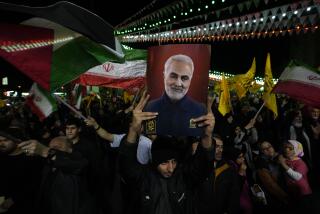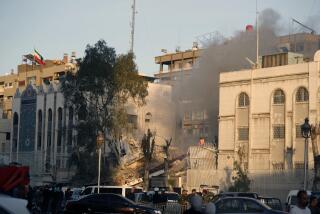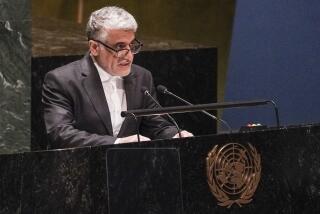Albania won’t be host site for destruction of Syria chemical weapons
WASHINGTON — Despite pressure from the Obama administration, Albania’s prime minister said Friday that he would not allow the destruction of Syria’s chemical weapons in the European country.
Prime Minister Edi Rama surprised some Western officials by saying in a televised address that it was “impossible” to take on the job of dismantling Syrian President Bashar Assad’s toxic arsenal because “we lack the necessary capacities to get involved in this operation.”
Rama bowed to growing protests in the small Balkan nation, where activists have opposed being the host country for the costly and complex process of neutralizing Syria’s weapons, because of concern over toxic waste.
The international watchdog agency overseeing the disarmament has called for the weapons to be destroyed outside Syria, which is in the midst of a civil war, and at a meeting Friday adopted a plan that calls for the “most critical” chemicals to be removed from the country by the end of the year. But Albania’s decision means it is unclear where the 1,300 tons of sarin, mustard gas, VX and precursor chemicals that Syria says it possesses will end up.
After Norway rejected a U.S. request to take in the chemicals for destruction, American officials leaned heavily on Albania, a former communist nation that destroyed its own chemical arsenal six years ago. Albania’s population is staunchly pro-American, and the U.S. ambassador, Alexander Arvizu, told an Albanian television channel late Thursday that the United States would be “disappointed” if Rama rejected the plan.
Western diplomats familiar with the negotiations said that Albania, a NATO member since 2009, was promised financial and technical support, although details weren’t disclosed.
Rama’s Socialist government, however, came to power this year pledging to stop importing conventional waste from other European countries, a moneymaking operation that had raised fear among some Albanians that their impoverished nation was becoming a trash dump.
Diplomats familiar with the matter said there was no apparent backup destination. France and Belgium are among the countries that U.S. officials have approached, according to reports.
“Albania was the front-runner, so it’s important now that we identify new options,” said a Western diplomat who requested anonymity because of the sensitivity of the negotiations. “But there’s still time, and there are a range of countries in the frame.”
Obama administration officials said they would respect Albania’s decision and remained confident that the disarmament effort would be completed by mid-2014, the deadline set by a United Nations Security Council resolution.
“Several countries are seriously considering and have seriously considered hosting the destruction efforts,” State Department spokeswoman Jen Psaki said.
She added, “We anticipate that the timelines will hold.”
Destroying the chemicals is a difficult and potentially hazardous process that involves burning them in extremely hot furnaces or injecting them with new chemicals that neutralize the toxicity. The process requires costly technology and produces industrial waste that must be disposed of in special facilities, which has raised environmental concern in Albania and elsewhere.
Inspectors with the Organization for the Prohibition of Chemical Weapons, the international agency leading the effort, have visited 22 of the 23 weapons sites that Syria has declared, and met a Nov. 1 deadline to destroy facilities used to mix chemical weapons or load them into munitions.
After a meeting in The Hague on Friday, the OPCW said it had overseen the destruction of more than 60% of Assad’s approximately 1,230 unfilled warheads and bombs.
But the effort is becoming more complicated as the group weighs how to transport the sensitive materials out of Syria, potentially passing through territory contested by pro-Assad forces and heavily armed rebels. Norway and Denmark have offered to help ferry the chemicals by sea to the destruction site, but it’s unclear how the materiel will be brought to port.
“This next phase will be the most challenging, and its timely execution will require the existence of a secure environment for the verification and transport of chemical weapons,” the OPCW director general, Ahmet Uzumcu, said in a statement.
The group called for nearly all declared chemicals and precursors to be taken out of Syria by Feb. 5, with the “most critical” chemicals removed by Dec. 31. The weapons facilities in Syria will begin to be destroyed Dec. 15, with March 15 the deadline for razing all of them.
OPCW spokesman Christian Chartier said uncertainty surrounding the chemicals’ destination wouldn’t delay progress on breaking up the rest of Assad’s program, one of the world’s largest.
“Today’s decision-making process is not hinging on any specific country’s situation,” Chartier said in a telephone interview from The Hague. “It’s not immediately necessary to know” where Assad’s chemicals will end up, he said.
More to Read
Start your day right
Sign up for Essential California for news, features and recommendations from the L.A. Times and beyond in your inbox six days a week.
You may occasionally receive promotional content from the Los Angeles Times.







